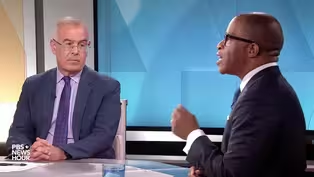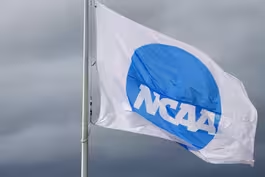
Louisiana reclassifies abortion pills, restricting access
Clip: 5/24/2024 | 5m 32sVideo has Closed Captions
Louisiana restricts access to abortion pills by classifying them as a controlled substance
A bill that would restrict access to abortion pills has been signed into law in Louisiana. The law reclassifies the drugs as a controlled substance, grouping them with Xanax and Valium. Possession without a prescription from a specially licensed doctor could be punishable by 5 years in prison. Amna Nawaz discussed more with Dr. Jennifer Avegno, director of the New Orleans Health Department.
Problems playing video? | Closed Captioning Feedback
Problems playing video? | Closed Captioning Feedback
Major corporate funding for the PBS News Hour is provided by BDO, BNSF, Consumer Cellular, American Cruise Lines, and Raymond James. Funding for the PBS NewsHour Weekend is provided by...

Louisiana reclassifies abortion pills, restricting access
Clip: 5/24/2024 | 5m 32sVideo has Closed Captions
A bill that would restrict access to abortion pills has been signed into law in Louisiana. The law reclassifies the drugs as a controlled substance, grouping them with Xanax and Valium. Possession without a prescription from a specially licensed doctor could be punishable by 5 years in prison. Amna Nawaz discussed more with Dr. Jennifer Avegno, director of the New Orleans Health Department.
Problems playing video? | Closed Captioning Feedback
How to Watch PBS News Hour
PBS News Hour is available to stream on pbs.org and the free PBS App, available on iPhone, Apple TV, Android TV, Android smartphones, Amazon Fire TV, Amazon Fire Tablet, Roku, Samsung Smart TV, and Vizio.
Providing Support for PBS.org
Learn Moreabout PBS online sponsorshipAMNA NAWAZ: A controversial bill that would restrict access to abortion pills has now been signed into law in Louisiana.
The bill reclassifies abortion pills as a controlled substance, grouping it with Xanax and Valium, and possession of the pills without a prescription from a specially licensed doctor could be punishable by up to five years in prison.
We're joined now from Louisiana by Dr. Jennifer Avegno.
She's the director of the New Orleans Health Department and an emergency medicine physician.
Dr. Avegno, this reclassifies two abortion medications.
What does that reclassification mean in practical terms?
DR. JENNIFER AVEGNO, Director, New Orleans Health Department: Well, practically, abortion medications are already illegal for elective terminations in Louisiana.
We have some of the most restrictive laws post-Dobbs.
So what we're really talking about now is not abortion care, but it is all the routine medical uses that mifepristone and misoprostol are used for every day, things like to induce childbirth, to stop uterine hemorrhage, miscarriages, and there are several other non-obstetric indications.
So this is really the routine practice of health care that these drugs are being mischaracterized as somehow dangerous drugs of abuse.
AMNA NAWAZ: Tell me a little bit about who's going to be most impacted by that.
I mean, you mentioned a little bit about some of the other uses for those medications.
But, based on the patients you see, the community you serve, who's going to be impacted?
DR. JENNIFER AVEGNO: Well, unfortunately, Louisiana has some of the worst maternal health outcomes in the country.
We do have really wonderful, dedicated providers who are doing their best every day to try to provide best practice, evidence-based care.
Whenever you place restrictions on a medication that is commonly used for miscarriage, for an example, that means that there are multiple both the provider and the patient now face to get a medication that would have been easy to get before.
Any barriers means that that patient might not get the care that's medically indicated.
And when you don't get the care that's medically indicated, you have a risk of getting worse.
If you're miscarrying and you can't access misoprostol, you could continue to bleed, hemorrhage, you could develop sepsis, you could end up in the emergency department, and lead to future problems with future pregnancies.
So these are unnecessary restrictions on the practice of medicine and routine health care that are definitely going to affect our already poor outcomes.
AMNA NAWAZ: Well, we mentioned briefly there that doctors could also be punished as a result of this restriction.
Tell me a little bit about what you're hearing from other doctors and what that impact could be on the medical community.
DR. JENNIFER AVEGNO: Well, the reason why nearly 300 of my physician colleagues and I wrote a letter urging that this amendment be removed is because we know how it's going to affect our ability to practice.
In Louisiana, we already criminalize physicians who would perform elective abortions.
So there's already a chilling effect on our providers, because it's -- the law is vague and there is the fear that in the practice of caring for a woman who is having a miscarriage or who needs to have a termination to save her life or for the health -- for her health, that someone's going to misconstrue that as doing an elective abortion.
And that physician could face jail time.
Again, making this practice of simply providing routine health care more criminalized leads to physicians having to make really terrible choices and ultimately deciding that they might not want to practice in a state like ours.
AMNA NAWAZ: Dr. Avegno, we pulled back the lens of it here.
We know, according to the reproductive rights think tank the Guttmacher Institute, that medication abortions do account for the majority of abortions in the U.S., some 63 percent last year.
And a number of states across the country already restrict access to those medications in some form, some with all-out bans, some just requiring some different level of restrictions on those medications.
You see those highlighted in orange there.
But this bill in Louisiana will make it the only state to categorize those two medications as controlled dangerous substances.
Do you see other states following that example?
DR. JENNIFER AVEGNO: Unfortunately, I do.
I'm very concerned.
And in talking to colleagues around the country, they are very concerned that this could be coming for them.
And, again, if elective medication abortion is already illegal, then why would we want to place barriers on health care that is legal?
Our concern is that it sets a precedent not just to do in other states, but what else could be inappropriately mischaracterized as a drug of abuse?
Could it be a drug that a lawmaker doesn't like?
Could it be contraception?
So this is really a dangerous precedent.
And I think that's why you find so many doctors willing to speak up about it, and not just obstetrics, our addiction physicians, our internal medicine, our psychiatry specialists.
This is something that affects the general practice of medicine in America.
AMNA NAWAZ: That is Dr. Jennifer Avegno, director of New Orleans Health Department, joining us tonight from Louisiana.
Doctor, thank you for your time.
DR. JENNIFER AVEGNO: Thank you.
Airlines working to create sustainable aviation fuel
Video has Closed Captions
Clip: 5/24/2024 | 8m 21s | How airlines are working to create sustainable fuel to reduce aviation's carbon footprint (8m 21s)
British pubs struggle to survive as drinkers stay home
Video has Closed Captions
Clip: 5/24/2024 | 5m 14s | British pubs struggle to survive as drinkers stay home (5m 14s)
Brooks and Capehart on Nikki Haley supporting Trump
Video has Closed Captions
Clip: 5/24/2024 | 12m 11s | Brooks and Capehart on Nikki Haley announcing her support for Trump (12m 11s)
NCAA and schools reach agreement to pay college athletes
Video has Closed Captions
Clip: 5/24/2024 | 6m 56s | What the historic $2.8 billion settlement to pay NCAA players means for college sports (6m 56s)
Thousands flee Myanmar amid flare up in civil war fighting
Video has Closed Captions
Clip: 5/24/2024 | 6m 46s | Thousands flee Myanmar for Thailand amid flare up in civil war fighting (6m 46s)
Providing Support for PBS.org
Learn Moreabout PBS online sponsorship
- News and Public Affairs

FRONTLINE is investigative journalism that questions, explains and changes our world.

- News and Public Affairs

Amanpour and Company features conversations with leaders and decision makers.












Support for PBS provided by:
Major corporate funding for the PBS News Hour is provided by BDO, BNSF, Consumer Cellular, American Cruise Lines, and Raymond James. Funding for the PBS NewsHour Weekend is provided by...




